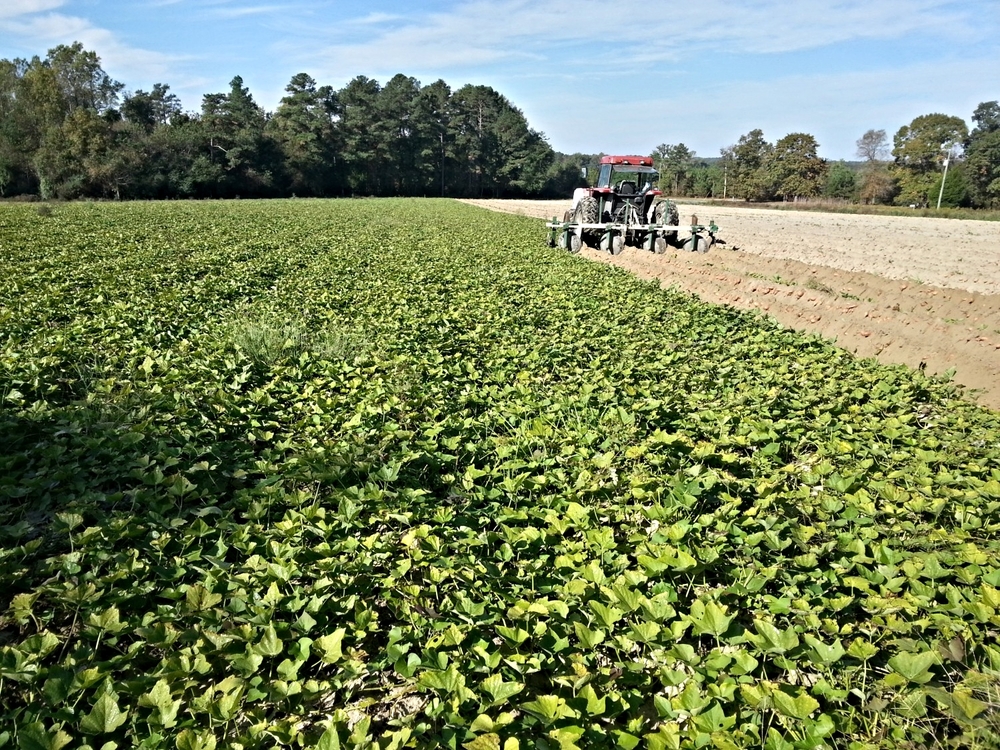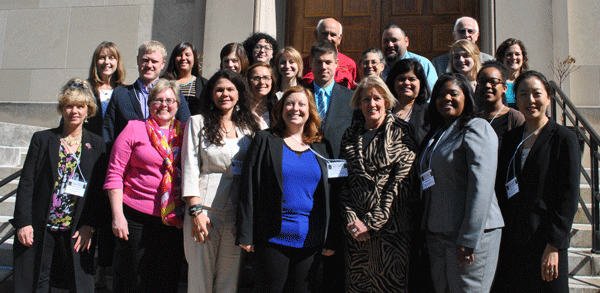by Jared Cates, CFSA Community Mobilizer | May 27, 2015 –

Sweet potatoes at CV Pilson Farm in Moore County
The Pilson family farm, known as CV Pilson Farm, has been in Moore County, North Carolina for five generations. Twenty-three-year-old Cliff Pilson followed his father, grandfather, great-grandfather and great-great-grandfather into farming. Historically a sweet potato and tobacco farm, Cliff is currently working to find new customers for the farm by diversifying his crops and fully transitioning out of tobacco. He takes great pride in selling his produce to public schools in his area and recently took a trip to Washington, DC to advocate for more federal funding for farm to school programs.
Over the years, Cliff’s relatives depended solely on the farm to provide for their families. Chester, Cliff’s father, molded the farm into a true business by finding multiple wholesale markets for their sweet potatoes and, like the three generations before him, he depended on the farm to provide for his family. Cliff’s father has laid the perfect foundation for Cliff to continue the family farming tradition and Cliff is very proud to take the reins and grow their business.
Today, the farm has around 15 acres of mixed fruits and vegetables, including strawberries, broccoli, blackberries, cabbage, collards, and cauliflower. As Cliff says, “Sweet potatoes are the foundation of the farm,” and they grow several varieties of the crop on about 100 acres.
CV Pilson Farm has an on-farm stand and sells at farmers markets and through a variety of wholesale outlets, including Lowe’s Foods. The farm is about to open a storefront in Southern Pines where they’ll be selling their produce, some value-added products like jams and jellies, baked goods, and other regional North Carolina products.
“It’ll be something different that they don’t have in town,” explains Cliff, “It will be fresher than any grocery store because we’ll be picking from the farm that morning and bringing it straight to the store for sale.”
Beyond sales numbers and retail and wholesale outlets for their products, Cliff and his family also have a strong commitment to their community. Producing healthy food for the children in his region became a passion for Cliff about 5 years ago when CV Pilson Farm started selling sweet potatoes to the Moore County and the Gaston County school systems.
In 2010, the Blue Cross Blue Shield Foundation of North Carolina made funding available to provide a multi-week series of GAPs (Good Agricultural Practices) trainings in Moore County through a partnership between FirstSchool Garden Program (now Good Food Sandhills) and Moore County Cooperative Extension. Cliff, his father, and his mother participated in the class and followed through with GAPs certification. This certification gives them confidence in their food safety practices and enables them to sell into markets that require this type of certification, like the NC public school system.
A year after getting GAPs Certified, Cliff received a phone call from Sebastian Naskaris, a FoodCorps Service Member in an inaugural FoodCorps Service Site in Moore County. Sebastian was working with Moore County Schools to find a local supplier of sweet potatoes. He had heard The CV Pilson Farm was a GAPs Certified producer. While Cliff had consistent markets for his potatoes already, he was instantly excited about the idea of kids in his community being able to eat his sweet potatoes on their school lunch plates. Soon after, Sebastian connected Cliff with Gaston County Schools who had heard about CV Pilson Farm’s amazing sweet potatoes and wanted to integrate them into their meal planning, too. Cliff was thrilled about these opportunities.
“I mean, finding new markets for your products is never a bad thing. But I was especially excited to start those relationships with the schools so that the kids can have better meal on their plate.”
Cliff Pilson
The efforts to bring local foods into Moore County Schools cafeterias were part of a larger movement underway to increase awareness about and access to fresh, local, healthy foods in the Moore County community. The county has a high percentage of kids on free and reduced lunch in the school system and the community is divided among economic lines with a largely rural and low-income population that is contrasted by the more suburban, well-to-do populations of Southern Pines and Pinehurst, which hosts many professional golf tournaments including the U.S. Open. As part of an effort to increase access to local healthy food, Moore County Schools Child Nutrition Director, Amanda Cagle, collaborated with NC FoodCorps and the FirstSchool Garden Program to source fresh, local products as a way to make their meals more appetizing and nutrient-dense for the students who were eating them.
“We have a very interesting county,” says Kathy Byron, Executive Director of Good Food Sandhills. She is the FoodCorps Site Supervisor for the NC FoodCorps Service Members in Moore County and also recently helped develop the Sustainable Food and Farming Systems Certificate Program at the Sandhills Community College. “We have communities on one side of the county living in high levels of poverty and on the other side – horse farms, country clubs, and golf courses.” Moore County has a large population of wealthy retirees, which makes it hard for Moore County to access resources to support their efforts to bring healthier fresh local food to their community as a whole.
However, thanks to lots of grant writing and hard work from folks like Kathy Byron and Amanda Cagle, there are many more opportunities for youth in the community to connect with fresh, local, healthy food than existed five years ago. Through Good Food Sandhills and the FirstSchool Garden Program, 61% of Moore County Schools now have school gardens, two with chicken programs. Moore County Schools is also now a member of the 10% Campaign, an initiative of the Center for Environmental Farming Systems that work to get commitments from institutional food facilities that they will work to source ten percent of their products from local suppliers. However, budgets, facilities, and equipment restraints continue to be major barriers to their efforts.
Since 2012, the United States Department of Agriculture (USDA) has been working to support these types of connections between school systems and local food producers and to give school systems the tools they need to integrate fresher, local products into their food programs. The Farm to School Grant Program, administered by USDA’s Food and Nutrition Service (FNS), has provided up to $5 million in grants each year on a competitive basis to schools, non-profits, state and local agencies, agricultural producers, and Indian tribal organizations to increase local food procurement for school meal programs and to expand educational activities on agriculture and food. There are typically three types of awards: planning grants for doing the homework needed in advance of starting a farm to school program; implementation grants to start a farm to school program or advance an existing program; and support service grants to provide broad-reaching support services to farm-to-school initiatives.
Though a relatively new program, the Farm to School Grant Program has already seen demand for funding far outweigh what is available. In recent years, this popular program has only been able to fund a fifth or less of the total proposals that the program has received. This clearly demonstrates the enormous popularity of and growth in farm to school activities around the country and the need for more funding to support these types of initiatives.
As part of the upcoming Child Nutrition Act Reauthorization this fall, Congress has the opportunity to build on the success of farm to school by strengthening and expanding the program’s scope and by providing additional mandatory funding. The Farm to School Act of 2015 – Senate Bill 569 and House Bill 1061 – will do that by continuing and expanding upon the successes of the USDA Farm to School Grant Program by:
-
Fully including preschools, summer food service program sites, and after school programs in the USDA Farm to School Grant Program (F2S);
-
Increasing annual mandatory funding from $5 million to $15 million to better meet the high demand and need for this funding;
-
Improving program participation from beginning, veteran, and socially disadvantaged farmers and ranchers; and
-
Increasing access among tribal schools to farm-fresh and traditional foods, especially from tribal producers.
The Carolina Farm Stewardship Association is working with the National Farm to School Network (NFSN) and the National Sustainable Agriculture Coalition (NSAC) (of which CFSA is a member) to support these efforts to strengthen and expand the program. CFSA recently helped connect NFSN and NSAC with Cliff so that he could take his story to Washington DC to gain more congressional support for the Farm to School Act of 2015.

Cliff flew to DC with a group of 24 farmers, school nutrition directors, extension agents, tribal representatives and farm to school advocates from 17 states to share their farm to school experiences with their members of Congress.
In April 2015, Cliff flew to DC with other people from around the country to call on Congress to provide additional funds for farm to school efforts. Cliff was part of a group of 24 farmers, school nutrition directors, extension agents, tribal representatives and farm to school advocates from 17 states who descended on Capitol Hill to share their farm to school experiences with their members of Congress. They collectively met with staff from 35 Congressional offices on both sides of the aisle, including Congressional leadership, the House Education and the Workforce Committee, Senate Agriculture Committee and the Senate Committee on Indian Affairs.
Cliff met with legislative assistants for Senator Thom Tillis and Representative Renee Elmers to tell his story about selling sweet potatoes to local school systems in NC. He urged them to support the Farm to School Act of 2015. “They were good discussions,” explained Cliff, “I really enjoyed meeting with our lawmakers and finding some common ground to talk about supporting local food in our local schools.”
 Cliff and his peers also told stories of how some schools can’t order enough fruit and vegetables because student consumption is up so much; how the local grocery store runs out of products that are featured in school that week; how farm to school inspires creativity in school kitchens; how farm to school involves farmers, fishers and ranchers; the challenges of navigating procurement regulations across different types of schools, especially in tribal communities; how schools are a great market for number two products that can’t be sold to grocery stores; how the need for intermediary food processing is creating new jobs; and more examples of how farm to school is a win for kids, a win for farmers and a win for communities.
Cliff and his peers also told stories of how some schools can’t order enough fruit and vegetables because student consumption is up so much; how the local grocery store runs out of products that are featured in school that week; how farm to school inspires creativity in school kitchens; how farm to school involves farmers, fishers and ranchers; the challenges of navigating procurement regulations across different types of schools, especially in tribal communities; how schools are a great market for number two products that can’t be sold to grocery stores; how the need for intermediary food processing is creating new jobs; and more examples of how farm to school is a win for kids, a win for farmers and a win for communities.
Farm to school is a common sense approach to child nutrition that empowers children and their families to make informed food choices while strengthening the local economy and contributing to vibrant communities. The efforts of people like Cliff Pilson, Kathy Byron and Amanda Cagle could be expanded tenfold with the types of supports afforded by a Farm to School grant. As more and more schools begin to source foods locally and teach children about food, farming, and nutrition, farmers, local communities, and children will all reap multiple benefits, improving public health, economic development, and education.
We at CFSA would like to extend a warm thanks to Cliff for making the trip to DC and for supporting the Farm to School Act of 2015. The current law, the Healthy, Hunger-Free Kids Act of 2010, is set to expire on September 30, 2015, so there is still time to ask your Congressperson to sign on as a co-sponsor of this important legislation.
For more information on the Farm to School Act of 2015 please visit our the CFSA Federal Food and Farming Issues webpage. For information on how you can support this bill, please contact CFSA Community Mobilizer Jared Cates at jared@


